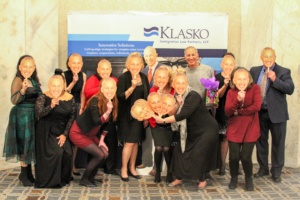Spending Bill Extends EB-5 Regional Center Program, Includes Immigration Provisions
Congress has passed a spending bill for fiscal year 2020 that includes several immigration-related provisions. President Trump is expected to sign the legislation. According to reports, highlights include, among other things:
- EB-5 regional center program sunset date extended to September 30, 2020
- A new ombudsman to investigate Department of Homeland Security personnel misconduct and violations of the rights of migrants in detention
- Provision for unannounced inspections of detention facilities and allowing lawmakers to visit them
- Information posted publicly on numbers and categories of people in U.S. Immigration and Customs Enforcement custody
- $1.38 billion toward President Trump’s border wall
January Visa Bulletin Includes Projections in Employment-Based Categories
The Department of State’s Visa Bulletin for January 2020 includes information on potential monthly movement in the employment-based categories. The bulletin also explains procedures for various programs set to expire, if not extended by Congress, including the EB-4 non-minister special immigrant religious worker program, the EB-5 regional center immigrant investor pilot program, the Conrad 30 waiver program for foreign medical graduates working in underserved areas, and E-Verify.
Details: Visa Bulletin for January 2020 is here.
USCIS Updates Guidance on Travel by TPS Beneficiaries in Removal Proceedings
U.S. Citizenship and Immigration Services (USCIS) has updated the USCIS Policy Manual to clarify the effect of travel outside the United States by temporary protected status (TPS) beneficiaries who are subject to removal proceedings.
In particular, USCIS noted, this update covers beneficiaries who have final removal orders, and who depart the United States and return with an advance parole travel document. TPS beneficiaries in removal proceedings who travel abroad temporarily with the authorization of the Department of Homeland Security (DHS) remain subject to those removal proceedings. If they are under a final order of removal, the travel does not execute or fulfill the order, USCIS said. The person in question remains subject to the removal order.
Details: USCIS policy alert is here. USCIS announcement is here. Application for Travel Document (advance parole) is here.
ICE Steps Up Deportations of DREAMers
According to reports, U.S. Immigration and Customs Enforcement (ICE) has escalated reopening of deportation cases that were administratively closed, in some instances long ago, against “DREAMers” under the Deferred Action for Childhood Arrivals (DACA) program. ICE told CNN that all DACA recipients whose deportation cases were administratively closed are being reopened. ICE said that “re-calendaring of administratively closed cases is occurring nationwide and not isolated to a particular state or region.”
Details: News report is here.
Justice Dept. Settles Immigration-Related Discrimination Claim Against Large Staffing Company
The Department of Justice announced on December 20, 2019, that it reached a settlement agreement with Adecco USA Inc. (Adecco), one of the largest staffing companies in the United States. The settlement resolves a claim that Adecco’s Gardena, California, office violated the antidiscrimination provision of the Immigration and Nationality Act by discriminating against a lawful permanent resident and other work-authorized non-U.S. citizens when verifying their work authorization. The settlement also resolves allegations that when using employment eligibility verification software, the company requested unnecessary work authorization documents from non-U.S. citizens because of their citizenship status.
Under the settlement, Adecco will pay $67,778 in civil penalties, ensure that its Form I-9 software complies with all relevant rules and regulations, and submit to monitoring and reporting requirements. Additionally, Adecco will ensure that relevant employees attend a training the Civil Rights Division approves and take a knowledge assessment to demonstrate their understanding of relevant rules.
“Employers must ensure that their onboarding software is compliant with relevant laws, and cannot make unnecessary demands for work authorization documents because of someone’s citizenship status,” said Assistant Attorney General Eric Dreiband of the Civil Rights Division.
Details: Settlement agreement is here. Press release is here.
House Passes Bill to Address Labor Shortage in Agriculture; Senate Prospects Unclear
By a bipartisan vote of 260-165, the U.S. House of Representatives passed legislation intended to ease the agricultural labor shortage by providing a path to legal status for agricultural laborers, allowing additional green cards, and making it easier to hire H-2A workers. The bill would also make E-Verify mandatory nationwide for farm employers and cap workers’ wages, among other things.
The bill establishes a “certified agricultural worker (CAW)” status. The bill states that the Department of Homeland Security (DHS) may grant CAW status to an applicant who (1) performed at least 1,035 hours of agricultural labor during the two-year period before October 30, 2019, (2) was inadmissible or deportable on that date, and (3) has been continuously present in the United States from that date until receiving CAW status. The bill would impose additional crime-related inadmissibility grounds on CAW applicants and make some other grounds inapplicable. CAW status would be valid for 5.5 years and could be extended, and DHS could grant dependent status to the spouse or children of a principal alien.
The bill makes various changes to the H-2A program, such as (1) modifying the method for calculating and making adjustments to the H-2A worker minimum wage, (2) specifying how an employer may satisfy requirements that it attempted to recruit U.S. workers, (3) requiring H-2A employers to guarantee certain minimum work hours, and (4) making the program available for year-round agricultural work and reserving a visa allocation for the dairy industry.
The bill also calls for DHS to establish a pilot program allowing certain H-2A workers to apply for “portable” status, which gives the worker 60 days after leaving a position to secure new employment with a registered H-2A employer.
Prospects in the Senate are unclear. Reportedly, some Republicans object to the legislation’s wage calculation formula and provision of “amnesty” to undocumented farmworkers, and a lack of inclusion of the meat and poultry sectors.
Details: Text of H.R. 5038 is here. Related news article is here.
USCIS Announces Implementation of H-1B Electronic Registration for FY 2021 Cap Season
U.S. Citizenship and Immigration Services (USCIS) announced that it has completed a pilot-testing phase and is implementing an electronic registration process for the next H-1B lottery. Employers seeking to file H-1B cap-subject petitions for the fiscal year 2021 cap, including those eligible for the advanced degree exemption, must first electronically register and pay the associated $10 H-1B registration fee. USCIS will open an initial registration period from March 1 through March 20, 2020.
Under the new process, USCIS said, employers seeking H-1B workers subject to the cap, or their authorized representatives, will complete a registration process that requires only basic information about their company and each requested worker. After the initial registration period, the H-1B random selection process, if needed, will be run on those electronic registrations. Only those with selected registrations will be eligible to file H-1B cap-subject petitions. The agency may determine that it is necessary to continue accepting registrations, or open an additional registration period, if it does not receive enough registrations and subsequent petitions projected to reach the numerical allocations.
USCIS said it will post step-by-step instructions on its website along with key dates and timelines as the initial registration period nears. USCIS will also conduct public engagements and other outreach activities.
Details: USCIS announcement is here. Klasko’s Client Alert is here. Sign up for this month’s webinar, which will cover this topic here.
USCIS Expands Guidance on ‘Good Moral Character’ Determinations
U.S. Citizenship and Immigration Services (USCIS) recently expanded its policy guidance on good moral character (GMC) determinations.
On December 13, 2019, USCIS expanded its policy guidance regarding unlawful acts that may prevent an applicant from meeting the GMC requirement for naturalization. USCIS said this update to its Policy Manual provides additional examples of unlawful acts and instructions for USCIS adjudicators, and further identifies unlawful acts that may affect GMC determinations based on judicial precedent. USCIS said this update does not change the impact of an unlawful act on the agency’s analysis of whether an applicant can demonstrate GMC. Adjudicators “are not limited by the examples listed in the Policy Manual,” USCIS noted.
On December 10, 2019, USCIS issued separate policy guidance in the USCIS Policy Manual about how two or more convictions for driving under the influence (DUI) or post-sentencing changes to criminal sentencing might affect GMC determinations. USCIS said it was implementing two decisions from the attorney general, Matter of Castillo-Perez and Matter of Thomas and Thompson.
Based on those two decisions, USCIS noted that “[w]hen applying for an immigration benefit for which GMC is required, applicants with two or more DUI convictions may be able to overcome this presumption by presenting evidence that they had good moral character even during the period within which they committed the DUI offenses.” Also, USCIS said, “[p]ost-sentencing orders that change a criminal alien’s original sentence will only be relevant for immigration purposes if they are based on a procedural or substantive defect in the underlying criminal proceeding.”
Details:
- USCIS’s December 13 guidance is here.
- The related announcement is here.
- USCIS’s December 10 guidance is here.
The related announcement is here.
Two Courts Grant Trump Administration’s Motions on Public Charge Inadmissibility Determinations Rule Challenge
On December 5, 2019, the U.S. Court of Appeals for the Ninth Circuit granted the Department of Homeland Security’s (DHS) motion for a stay of the preliminary injunctions granted by the U.S. District Courts for the Northern District of California and Eastern District of Washington with respect to a challenge to the Trump administration’s public charge inadmissibility determinations rule. On December 9, 2019, the U.S. Court of Appeals for the Fourth Circuit granted DHS’s motion for a stay of the preliminary injunction granted by the U.S. District Court for the District of Maryland.
DHS remains bound by a nationwide injunction issued in a case pending before the U.S. District Court for the Southern District of New York and an injunction limited to the state of Illinois pending before the U.S. District Court for the Northern District of Illinois. Related litigation continues before the U.S. Courts of Appeals for the Second and Seventh Circuits.
The final rule being challenged, issued in August 2019, prescribes how DHS would determine whether a person is inadmissible to the United States based on his or her likelihood of becoming a public charge at any time in the future.
Details: USCIS announcement is here.
U.S. Grounds Hundreds of Saudi Aviation Students After Pensacola Attack
After an attack on Naval Air Station Pensacola by a Saudi military aviation student that resulted in multiple casualties, the United States has temporarily paused all flying by Saudi aviation students. According to reports, this affects more than 800 students nationwide, although they are permitted to continue attending classroom training.
Defense Secretary Mark Esper reportedly has also ordered a review after the Pensacola shootings.
Details: News report is here.
KLASKO NEWS
FIRM NEWS
Klasko Immigration Law Partners has launched a series of webinars covering various litigation options for clients. Three recordings are currently available to view at leisure, and the final live webinar for universities, hospitals, and research institutions is still open for registration and will take place on Tuesday, January 14.
Click the titles below to view a recording:
- When All Else Fails: Pursuing Litigation to Overcome Denials and Delays – Litigation for Businesses
- Overcoming EB-5 Denials and Delays through Litigation – Litigation for EB-5 Investors
- Suing for a Solution: Litigation Options for Immigrants
IN THE NEWS
Michele G. Madera
Michele was featured in the Greater Philadelphia Hispanic Chamber of Commerce member newsletter talking about her transition to partnership and how to juggle being the boss.
William A. Stock
Bill Stock was quoted in the Wellston Journal on December 16, about the business of being an immigration lawyer during these challenging times.
Elise A. Fialkowski
Elise and her panel at the LawLogix I-9 Palooza event were mentioned in the LawLogix blog covering the Top 10 Takeaways from the event.
Jordan J. Gonzalez
News of new associate Jordan joining the firm was covered in the Philadelphia Business Journal’s ”People on the Move” section.
Andrew J. Zeltner
Drew’s latest client alert covering updates on the H-1B Cap Electronic Registration System was published on JD Supra.
RECENT SPEAKING ENGAGEMENTS
Ronald Klasko | William A. Stock | Daniel B. Lundy | Anu Nair
In a series of exclusive Klasko webinars covering litigation options for various clients, Klasko partners have covered options for businesses, EB-5 investors, and individual immigrants.
Karuna Simbeck | Jordan J. Gonzalez
On December 12, associates Karuna and Jordan spoke to faculty and students at Bryn Mawr College about the logistics and options available to DACA recipients.
Elise A. Fialkowski | Michele G. Madera
Elise and Michele conducted a webinar for Society for Human Resource Managementon December 5 covering the latest updates regarding immigration and how it affects worksite compliance.
UPCOMING SPEAKING ENGAGEMENTS
Jordan J. Gonzalez
Jordan will be speaking at Delaware Valley University for Penn State Extension’s Southeast Pennsylvania Green Industry Conference, covering both the H-2A and H-2B visa programs for the agricultural industry.
William A. Stock | Elise A. Fialkowski | Michele G. Madera
On January 16, join Bill, Elise, and Michele for this webinar as they cover the most recent updates to the 2020 H-1B lottery including the pre-registration system, plus annual strategic guidance and advice.
Andrew J. Zeltner | Jordan J. Gonzalez
Associates Drew and Jordan will be speaking to Temple University’s scholars, faculty, and staff on their options for permanent residency on January 24, 2020.
ICYMI: RECENT BLOG POSTS AND ALERTS
New EB-5 Regulations are in Effect, Now What?
Associate Vicki Li tackles what the new EB-5 regulations look like now that they have taken effect in this article penned for The Legal Intelligencer.
Klasko Webinar: Suing for a Solution
The most recent Klasko webinar in the four-part series on litigation options is specifically for self-sponsored immigrants. Watch the recording here.
CLIENT ALERT: USCIS Will Proceed With H-1B Cap Electronic Registration Process
Drew Zeltner covered the news of USCIS’ announcement of the implementation of the H-1B electronic registration process for the 2020 lottery in this client alert.
Klasko Webinar: Overcoming EB-5 Denials and Delays through Litigation
On December 4, Ron Klasko, Dan Lundy, and Anu Nair covered the litigation options available to EB-5 investors for dealing with issues like extended delays and unreasonable denials. Watch the recording here.
Klasko Webinar: Pursuing Litigation to Overcome Denials and Delays
Companies that sponsor foreign nationals are also experiencing adjudication delays, inconsistent decisions, and increased denials. Watch this webinar recording for litigation options specifically for businesses.
FIRM FEATURE




On Friday, December 6, the firm surprised Ron Klasko with a different twist on the holiday party – it doubled as a milestone birthday for him! Staff, family, and friends all gathered in their best attire at the Ritz-Carlton Grand Ballroom to celebrate Ron Klasko and the firm’s success under his leadership for over 15 years.
Stay Connected! Subscribe to our blog and follow us on Twitter, Facebook, and LinkedIn.
This newsletter was prepared with the assistance of ABIL, the Alliance of Business Immigration Lawyers, of which Klasko Immigration Law Partners is an active member.
